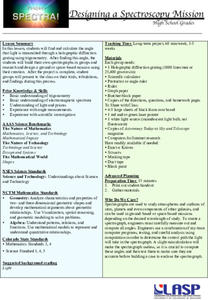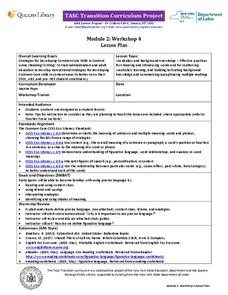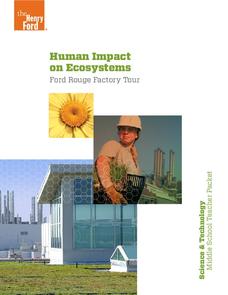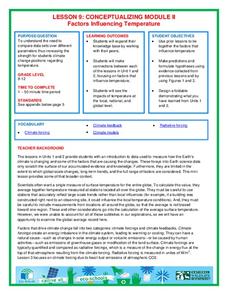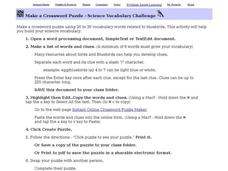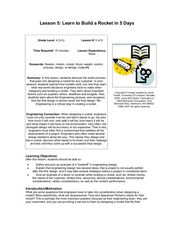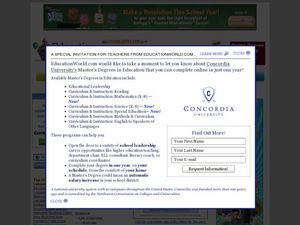Foundation for Water & Energy Education
What is the Water Cycle? Activity B
Curious physical scientists follow a lesson on the properties of water with this lesson on distillation. They observe a miniature water cycle model that filters dirty water into clean water. These two lessons combined are an enriching...
University of Colorado
Designing a Spectroscopy Mission
Design a mission over the rainbow. Small groups spend several weeks together determining a mission related to spectroscopy. The teams build spectrographs and analyze the design to determine whether it will carry out the mission. At the...
American Chemical Society
The Water Cycle
Bring the water cycle into the classroom without the mess. Learners build a model of the water cycle using everyday materials. They observe the process of evaporation and condensation and relate their observations to the larger scale...
New York State Education Department
TASC Transition Curriculum: Workshop 4
Why is it important to use precise language? Participants explore this question in the fourth activity in a series of 15 on effective instruction. Perfect for all content areas, the activity promotes appropriate language choice through...
Curated OER
Building a Mini-Park and Bird Sanctuary
Students build a list of gardening vocabulary from prior knowledge of gardens. In this gardening lesson, students understand the importance of gardens to humans and animals for food, shelter, and air. Students discuss the garden in...
Curated OER
A Home Energy Audit
Students investigate ways to save energy. In this environmental instructional activity, students play the role of a building inspector and identify "culprits" that waste energy. Students use a checklist to identify specific practices...
Curated OER
Dream Stream
Investigate the parts of a healthy stream to build content-specific vocabulary and ecological awareness. The class builds vocabulary and determines why clean water is important for trout. They design a shoe box to show what a clean...
Ask A Biologist
Viral Attack
Can you catch the same cold twice? Elementary and middle schoolers learn about what happens when a virus attacks their bodies, and how the immune system never forgets a virus, with an entertaining comic book. The packet includes...
Teach Engineering
Earthquakes Living Lab: FAQs about P Waves, S Waves and More
Let's talk about earthquakes .... Using the Internet, pupils research what causes earthquakes, how scientists measure them, their locations, and their effects. The resource is not only informative, but it also builds crucial research...
Discovery Education
How's the Weather?
Young meteorologists explore different aspects of the weather while learning about measurement devices. They build instruments and then set up a weather station outside and measure temperature, humidity, air pressure, wind speed, and...
University of Texas
The Origin of Bone Names
The rib bone's connected to the xiphiod! But, what two Greek words are related to xiphiod? And what do certain Latin terms mean? Build understanding of the bones in the human body as well as Latin and Greek vocabulary with a scavenger...
Curated OER
Survival Still
Lead your class to construct a solar still on campus to demonstrate how water can be extracted from the soil. The power of solar energy is emphasized, as is the concept of how capillary water can be recovered and purified by using a...
North Carolina State University
Exploring Genetics Across the Middle School Science and Math Curricula
Where is a geneticist's favorite place to swim? A gene pool. Young geneticists complete hands-on activities, experiments, and real-world problem solving throughout the unit. With extra focus on dominant and recessive genes, Punnett...
Cornell University
Buoyancy
Swimmers know to float by turning their bodies horizontally rather than vertically, but why does that make a difference? In an interesting lesson, scholars explore buoyancy and the properties of air and water. They test cups to see which...
Henry Ford Museum
Human Impact on Ecosystems
An environmenta science unit includes three lessons plus a cumulative project covering the ecosystem. Scholars follow the history of the Ford Rouge Factory from its construction on wetlands and how it destroyed the environment to its...
National Wildlife Federation
Conceptualizing Module II - Putting It All Together
"Creativity is just connecting things." - Steve Jobs. After weeks of researching climate change, the ninth lesson in a series of 21 combines the data and analysis to address essential questions. It covers natural phenomenon, human...
Montana State University
What's the Weather?
How many jackets do you need to stay warm and climb Mount Everest? An informatie resource covers the topic of Mount Everest, the resource helps young scientists discover the difference between climate and weather. Activities include...
Curated OER
Science Vocabulary Crossword Puzzle
In this crossword puzzle activity, students follow directions to make a crossword puzzle out of their science vocabulary. Students follow 6 sets of directions.
Curated OER
Learn to Build a Rocket in 5 Days
Students explore physics by participating in an engineering activity. In this rocket lesson, students define a list of scientific vocabulary terms such as "re-engineering" and "trade-off." Students identify the rocket creation process by...
Curated OER
Build A Borneo Glider!
Students construct a paper glider. In this physics of gliding instructional activity, students first learn about Borneo and it's rainforest habitat. After students discover the way animals in Borneo glide from tree to tree, they use...
Consortium for Ocean Science Exploration and Engagement (COSEE)
Understanding the Food Web
Building on prior knowledge of the pervious lesson plan in the series, pupils explain the previous lesson plan to each other. Then they write a simple guide for a young child to read on the same topic.
Curated OER
Kids Build Pumpkin-Tossing Catapult
Learners read a news article about the creation of a catapult that will throw pumpkins. In this current events activity, the teacher introduces the article with a discussion of catapults and a vocabulary activity, then students read the...
Curated OER
Spiders Build Giant Web in Texas Park
Learners make predictions about a photograph of a humongous spider web, then read a news article about thousands of spiders that worked together to build it. In this biology and current events instructional activity, the teacher...
Curated OER
Activity Plan 5-6: Bugs, Bugs, Bugs!
Students become entomologists for a day. In this life science lesson, students go on an insect hunt and investigate insects and their homes. This leads to the creation of an insect by each student. Lesson includes a take-home activity...



